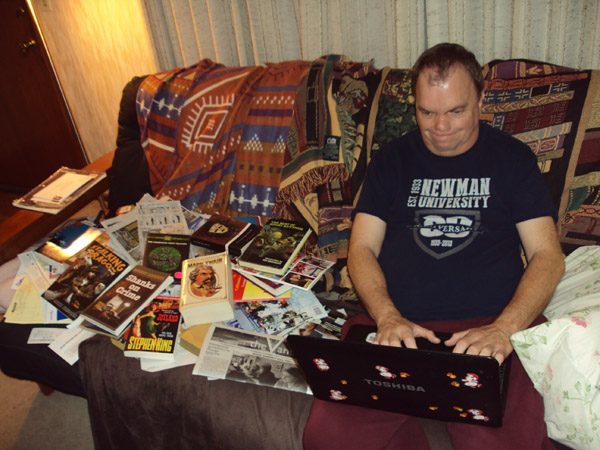We all deal with rejection in our own way. To some, anything that feels like the slap on the hand they got from touching something forbidden as a child can discourage them from trying again, certain that their manuscript isn’t worth the paper it was printed on.
But a rejection slip doesn’t necessarily mean your work is crap. Maybe you’ve approached the wrong publishing house or they’ve stopped accepting submissions for whatever reason. It helps when the rejection is personalized but most of the time it’s just a note to let you know they’re taking a pass on your work.
I’m just happy when one of my self-addressed-stamped-envelopes finds its way home because I obsess about whether a story even got to where I sent it, if anyone has read it yet, and if I’ll ever know if they liked it or not. So as much as I hate a rejection, it’s better than no response at all.
My father was a poet and a song writer – and my first inspiration. He routinely locked himself away in his room for hours, sometimes days, writing really bad cowboy love songs.
My mother despised this behavior and did everything she could to sabotage his efforts, including starting fights to draw him out of his reveries. And while other kids bought their fathers slippers or ties for birthdays or Christmas, I gave my Dad notebooks, pens and postage stamps.
He mailed his poems and songs to New York or California, and kept track of the submissions in one of those notebooks. He diligently sent reminders and collected rejection slips like they were postcards from exotic countries.
You can imagine my mother’s dismay when I also developed hermit writer tendencies. My father took a great interest in my songs and we even collaborated on one, but while my musical influences ran to Led Zeppelin and Jethro Tull, Dad was a true-blue Hank Snow fan. The resulting song was so lame that we both went back to our own caves to write our own versions to make up for it.
Three times over two decades I’ve sent out groups of short stories to fiction magazines, only half-following the guidelines just to have a decent list of places to submit to. But that’s like spamming the entire job market with résumés hoping that one of them will stick. I wasn’t as diligent as my father had been in selecting his potential markets, but he’d never been successful in selling his work so I didn’t have much confidence in the process either way.
I pasted those few rejection slips that I received into a book. Like father, like daughter. The next batch went by email a few years later and any responses I received have been lost in the spider web of folders on my computer. So much for scrapbooking.
As much as I wanted to see my work published, I was more interested in making up stories to entertain my friends than in marketing my work. It was easy to convince myself that it was enough to write a story down and get on with the next one. Sometimes that’s enough, but not always. The goal I’d had as a kid was not to just to write down stories; it was to write library books.
I read a lot of books, all the time. I check out their copyright pages, usually after I’ve read enough of a book to be curious about when it was written and where it was published. I read the authors’ bios and I appreciate when they include a photo. I look for clues to their success and wonder if we may have travelled to the same imaginary lands in our quests for stories.
I also love to meet other writers, whether published or not. It’s like running into someone from your hometown when you’re on the other side of the country. Sometimes it’s instant kinship. Other times it might lead to awkward silence while we ponder what we might have in common aside from the compulsion to put down on paper the very thoughts in our heads.
But you find allies in the most unlikely places. Same goes for literary contacts. I met someone at work who’d published her own novels had found a measure of success by starting up her own publishing house. She’d hung her shingle and was now ready to take on other authors and guide them through the crocodile infested waters of the publishing world.
She announced a short story contest, which I entered, and thus was born a thriving creative relationship. I’m now part of an inspiring writers’ collective that meets regularly to read, write, and share ideas about publishing and marketing. I’m learning about the process of writing those library books.
My father didn’t live long enough to see my first novel published. I suppose he’d be proud, but more than that he’d be smug. He believed that if you kept writing, and if you consistently flogged that work, you would eventually see your words in print.
“You must keep sending work out; you must never let a manuscript do nothing but eat its head off in a drawer. You send that work out again and again, while you’re working on another one. If you have talent, you will receive some measure of success – but only if you persist.”
– Isaac Asimov











I've been thinking those rejections could be a gold mine for red shirt names. Mix and match frist and last names and use them for those characters who's deaths serve only to show how bad a villain is, for example.
That would make for a long list of red shirts…I don't have that many characters to kill off, lol.
It's very sad that so many writers don't understand the true meaning of rejection. The number of rejections you get are exactly proportional to the amount of success you experience. I write about this frequently in my day job blog:
https://www.inc.com/geoffrey-james/transform-rejec…
As I point out in that post, I used to lay out my rejection letters on the floor and walk over them while visualizing my ultimate success as a writer.